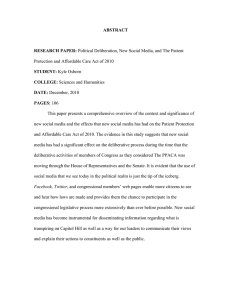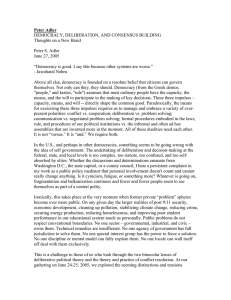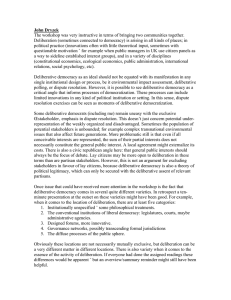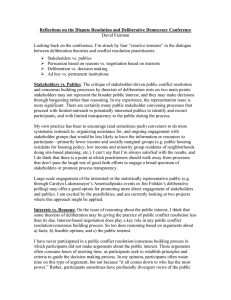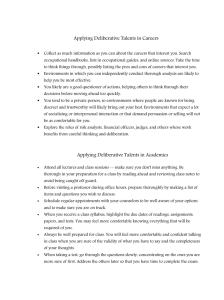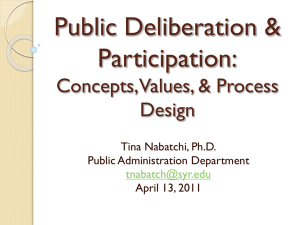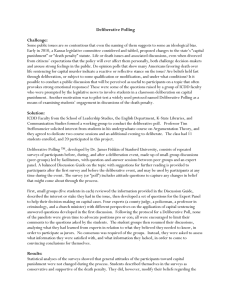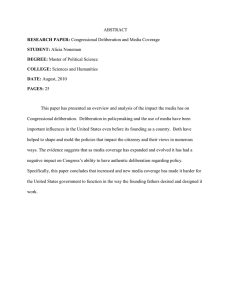Jane Mansbridge
advertisement
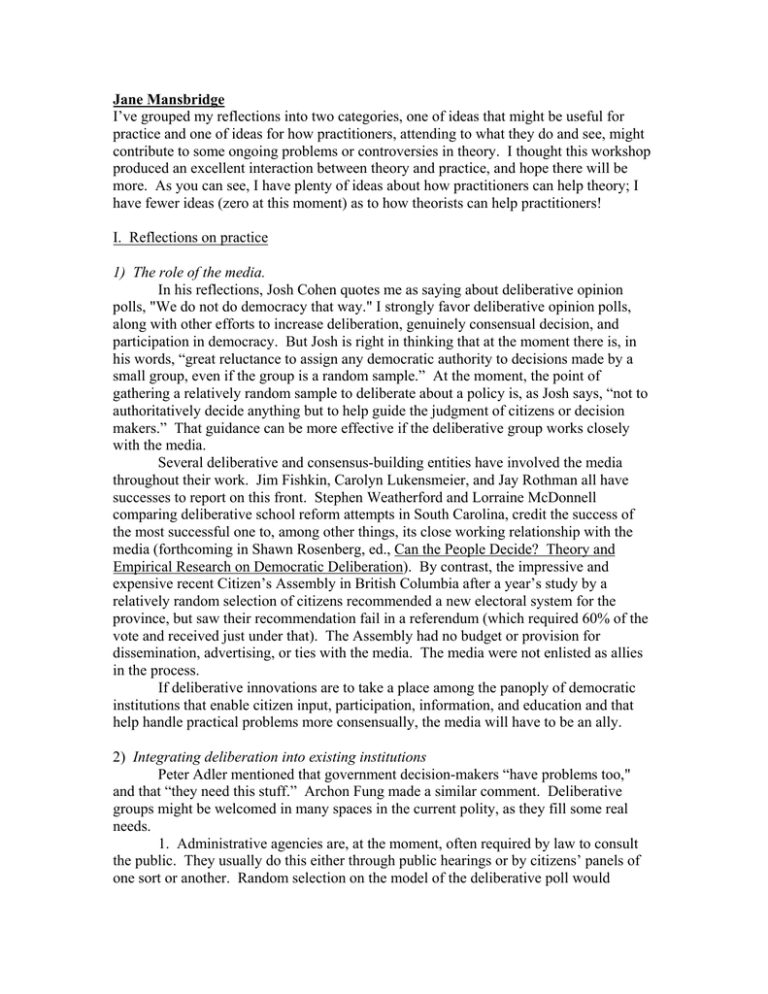
Jane Mansbridge I’ve grouped my reflections into two categories, one of ideas that might be useful for practice and one of ideas for how practitioners, attending to what they do and see, might contribute to some ongoing problems or controversies in theory. I thought this workshop produced an excellent interaction between theory and practice, and hope there will be more. As you can see, I have plenty of ideas about how practitioners can help theory; I have fewer ideas (zero at this moment) as to how theorists can help practitioners! I. Reflections on practice 1) The role of the media. In his reflections, Josh Cohen quotes me as saying about deliberative opinion polls, "We do not do democracy that way." I strongly favor deliberative opinion polls, along with other efforts to increase deliberation, genuinely consensual decision, and participation in democracy. But Josh is right in thinking that at the moment there is, in his words, “great reluctance to assign any democratic authority to decisions made by a small group, even if the group is a random sample.” At the moment, the point of gathering a relatively random sample to deliberate about a policy is, as Josh says, “not to authoritatively decide anything but to help guide the judgment of citizens or decision makers.” That guidance can be more effective if the deliberative group works closely with the media. Several deliberative and consensus-building entities have involved the media throughout their work. Jim Fishkin, Carolyn Lukensmeier, and Jay Rothman all have successes to report on this front. Stephen Weatherford and Lorraine McDonnell comparing deliberative school reform attempts in South Carolina, credit the success of the most successful one to, among other things, its close working relationship with the media (forthcoming in Shawn Rosenberg, ed., Can the People Decide? Theory and Empirical Research on Democratic Deliberation). By contrast, the impressive and expensive recent Citizen’s Assembly in British Columbia after a year’s study by a relatively random selection of citizens recommended a new electoral system for the province, but saw their recommendation fail in a referendum (which required 60% of the vote and received just under that). The Assembly had no budget or provision for dissemination, advertising, or ties with the media. The media were not enlisted as allies in the process. If deliberative innovations are to take a place among the panoply of democratic institutions that enable citizen input, participation, information, and education and that help handle practical problems more consensually, the media will have to be an ally. 2) Integrating deliberation into existing institutions Peter Adler mentioned that government decision-makers “have problems too," and that “they need this stuff.” Archon Fung made a similar comment. Deliberative groups might be welcomed in many spaces in the current polity, as they fill some real needs. 1. Administrative agencies are, at the moment, often required by law to consult the public. They usually do this either through public hearings or by citizens’ panels of one sort or another. Random selection on the model of the deliberative poll would provide a better model, and one that would give administrators a better idea of what the reflective public would want. (I don’t think it a good idea, however, to replace all public hearings, because they a) provide a focus for political organizing and b) bring out adversary issues that consensually-oriented deliberative groups sometimes avoid.) 2. Elected representatives faced with controversial issues often want to pass the buck. If they could commission a deliberative poll, or a larger participatory deliberation on the order of America Speaks, that entity could give them political cover. 3) Involving marginal citizens Archon Fung is right that the best way to involve marginal citizens (e.g. very low SES citizens) is to empower deliberations on topics of great importance to those citizens (e.g. the Chicago police beat meetings). When topics are more diffuse, random samples help greatly, as does targeting marginal areas for special recruiting. I was very taken, in addition, by Mariannella’s technique of going to people’s houses and asking for their perspectives in their own settings. My own view is that you need one-on-one interviews first, to get people involved, and Mariannella suggested beginning with life histories, which I too find infinitely better than coming to people with a prepared list of questions, especially on some policy matter. II. Practitioner-theorist alliances 1) Is bargaining part of deliberation? Most deliberative theory sees bargaining as the opposite of deliberation. In my own view, in even the simplest bargain (I trade my three oranges for your four apples), both parties often learn a little about how much they value what they have and what others have. In negotiation (in contrast to simple bargaining), you need empathy and creativity to come up with solutions to the problem that give others what they underlyingly want at less cost to you than what they had originally proposed. So even bargains, but particularly negotiations, contribute to the clarification of interests. They could easily be part of deliberation, as I see it. Maarten commented, “Well, compared to Habermas’ ideal of a free-speech situation we have to do quite a bit of arm-twisting, back stage most of the time, to secure a deal.” It would be helpful for theorists if practitioners were able to scrutinize the times in which they had to do “quite a bit of arm-twisting,” to understand conceptually what was going on. In my view, constraint, including coercive power, is part of life. We can try to minimize it, in order to approach the ideal speech situation of no power, and we can also try to make it more legitimate. Practitioners could help in documenting what they considered good uses of coercive power in the deliberative situation, and the degree to which they concluded, on the basis of practice, that bargaining and negotiation were helpful or harmful additions to deliberation. 2) How important is authenticity? And how measure it? Speaking authentically (without intent to deceive) is a central part of Habermas’s view of “communicative’ rather than “strategic” action. In deliberative polls, forums like America Speaks, the British Columbia Citizens’ Assembly and other advisory deliberative groups, there is little incentive intentionally to deceive. In bargains and negotiations there is far more incentive. Is this a reason that bargaining cannot be included in deliberation? What is the effect in negotiation of the discovery that a participant has intended to deceive? Do different negotiations have different norms? Is authenticity absolutely necessary for good deliberation? This is a question on which theorists could learn much from practitioners. 3) What biases do different processes introduce? Maartin introduced this issue, and Judy Innes sums up some of the possibilities. It is another important area in which practitioners are in a better position to contribute to theory than theorists. 4) Do we have examples of individuals clarifying their interests and values? For me, a major goal of deliberation is the clarification of interests and values. So I support Frank in wanting more “discussion about how DR processes encourage learning about others' and one's own interests and furthermore about ‘value,’ about what's at stake….” Although most deliberative theory rules self-interest off the table in deliberation, I see deliberative purposes in uncovering conflicting interests in situations that were wrongly described as the common good as well as vice versa. It would be helpful if practitioners could particularly note the moments when self-interest come on the table and could think about their relative legitimacy and lack of legitimacy when they do.
